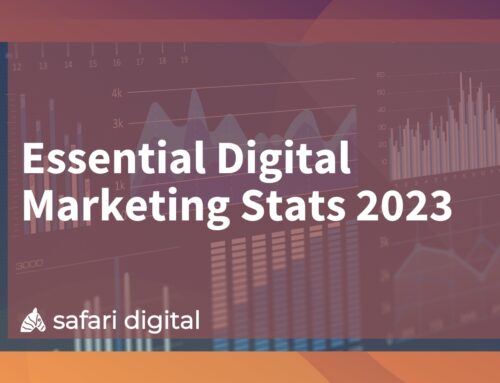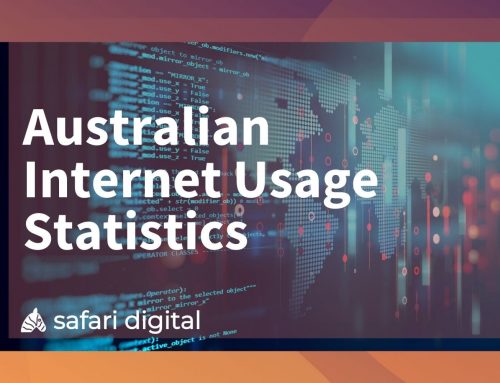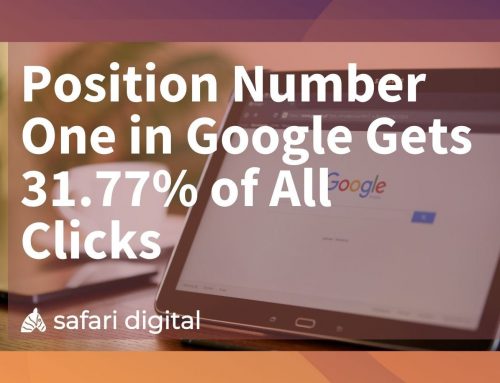
15 SEO Trends that will change the way that websites rank and perform in organic search.
Search engine optimisation is rapidly evolving and changing. The strategies and tactics that were effective five or six years ago are now (in large) obsolete. SEO professionals need to adapt quickly and anticipate how trends, technology, and emerging search behaviour impact the way that Google (and other search engines) function.
At Safari Digital, we spend a significant amount of time and resources testing and experimenting with the Google algorithm to understand what is working and how Google is constantly evolving.
To provide you with actionable insights to stay ahead, we have compiled a list of 15 SEO trends that you need to be across for SEO success.
Whether you’re a business owner, a fellow marketer, or just an SEO nerd that can’t seem to get enough of Google’s continuous and volatile algorithm updates; this list will provide valuable, simple to understand insights from Australia’s leading SEO Agency.
So, without further ado, let’s take a look at the SEO trends we’ve seen already, and what we predict to follow in the coming months.
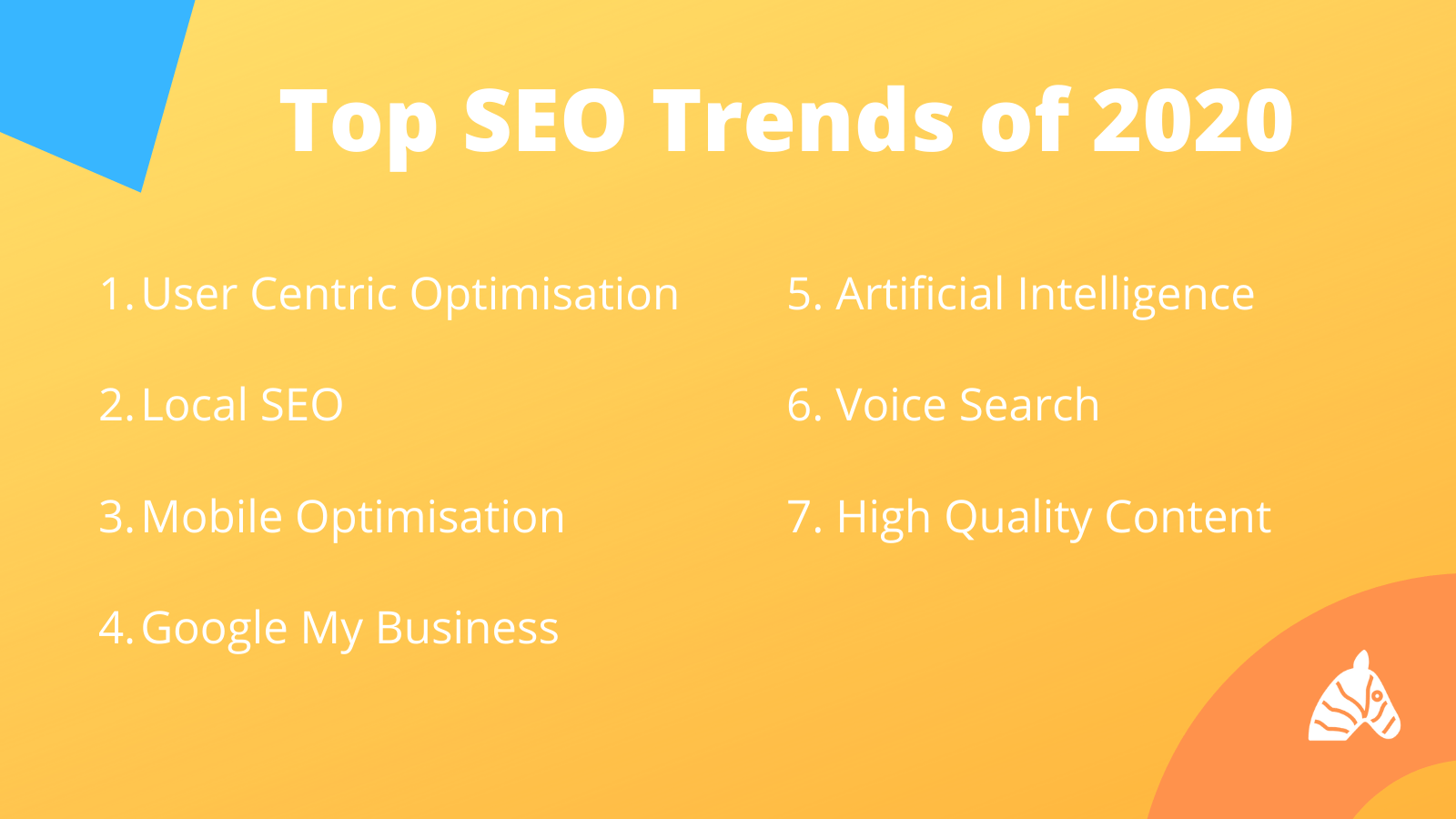
1. Optimise for the User, Not Google
As Google reminds us with every update, the future of site optimisation should be centred around tailoring for users. Forget about the “best hacks” to get your site ranked, the most valuable tool you can implement to your website is making it more user friendly. As Google’s algorithm becomes more sophisticated, it will only continue to evolve into a system that prioritises the pages the provide the best user experience. One of the biggest SEO trends that we are seeing is how everything within the search and Google community becomes back to user optimisation. Google’s latest ‘Helpful Content’ Algorithm Update is designed to take this a step further by rewarding sites that create content for the user – not just for search engines.
User-centric optimisation is one thing, but how do we know what our users want? Today, there is an abundance of tools available for webmasters to analyse and collect data on what their users are doing on-site, user engagement with content, and what users might be looking for. Leveraging these tools to collect as much data as possible on user behaviour is the only way to accurately improve the user experience of your webpages.
Optimising for your users requires a process of trial and error, A/B testing, and further collection of data. In essence, once you begin to optimise your site for users, you probably won’t ever stop. There’s no such thing as a perfect landing page – there is only data collection, implementation, and evaluation. While UX experts have long been aware of its importance, Google’s constant stream of algorithm shifts means that user optimisation is quickly becoming one of the significant SEO trends.
2. Focus on Local SEO
Local SEO is the most effective way for local businesses to drive motivated customers to their websites. If you’re not optimising your business for local search, you could be missing out on more than 70% of your potential customers. As more people realise the potential local SEO can provide for their business, the more competitive local markets will become for each industry.
Instant gratification means that brick and mortar stores are still thriving in the midst of the global pandemic. Local SEO provides an unprecedented opportunity for local businesses with physical storefronts to optimise their online presence to promote offline transactions. 72% of users who make a Google search visited the relevant store within 8km of where they made their search. Furthermore, 28% of searches that include local intent will result in a purchase.
Not only is optimising for local search only becoming more critical, but local SEO is also changing accordingly. As more businesses begin to realise the value of local search, marketers are having to implement more comprehensive strategies to get their websites ranking well. One of the biggest SEO trends that we have noticed is the adaption of local landing pages – a simple, yet effective strategy for service-based businesses to improve their visibility in their operating areas.
However, local SEO is not just for service and storefront businesses. In fact, for almost every type of organisation, having a local strategy in place is crucial to having your business exposed to the right people at the right time.
3. Mobile Device Optimisation
The latest stats reveal that 87% of internet users are on their mobile phones, with 40% of all online transactions occurring on mobile. If that doesn’t convince you of the importance of mobile optimisation, this should: Google has officially moved to mobile-first indexing to improve the mobile search experience. Mobile-first indexing means just that; mobile sites will be indexed first. That also means that if your website is not mobile-friendly, your site will experience less frequent indexing and no rewards in the search engine results.
If you want your business to survive online, it is absolutely crucial to optimise your site for mobile search. Instead of visualising someone sitting at a desktop or laptop on your website, it’s time to wake up and realise that most people are accessing the internet via their mobile.
Not only will optimising your site for mobile enormously enhance the user experience, but Google will start to rank your website over those who are yet to make the switch. Mobile-friendliness is one of the vital SEO trends and will only continue to become more important for website experience. The bottom line is, the sites not optimised for mobile are only going to continue to fall by the wayside.
4. Keep Your Google Business (Formerly GMB) Up to Date
It should come as no surprise that Google My Business is amongst the top SEO trends. Visibility on Google as a local business has never been more important for sustained growth and online success. 4 in 5 consumers use search engines to find local information, and today, Google Business is the largest and most popular platform for both local businesses and consumers.
As a local business, Google My Business brings with it a myriad of benefits that business owners need to know about. These benefits include helping to reach new customers, increase overall online visibility, ensuring customers are finding information as easily and quickly as possible, and providing fresh and up-to-date news on the organisation.
Local searches go far beyond the simple discovery of new businesses in the area. Consumers are always on the go looking for directions, contact information, reviews, how busy locations are, and more. This is where Google My Business comes in.
Working in conjunction with Google Search and Google Maps, GMB combines proximity with visibility to provide consumers with businesses for their search queries. Specifically for local search, not having a GMB listing means missing out on Google maps listings and the local pack.
Google My Business allows businesses an opportunity to appear in listings they otherwise couldn’t, the ability to collect and show reviews, get insights into their business data, and provide accurate and up-to-date regular business news. Google My Business is not a new tool; however, adapting and optimising your GMB listing is quickly becoming one of the key SEO trends of this year.
5. Artificial Intelligence
As technology evolves, search engines are relying on artificial intelligence, machine learning, and deep learning to process searches, then predict which results will satisfy the given search. Artificial intelligence and machine learning are only becoming more and more influential over Google’s ranking and search algorithm; making the technology a huge contributor to SEO trends.
The most recent step of this progression of artificial intelligence was the introduction of Bidirectional Transformers for Language Understanding (BERT) which was announced and implemented in October of 2019. BERT is Google’s network-based technique for natural language processing, dealing with the very fundamentals of how people search online.
BERT is just a small glimpse of what is to come with artificial intelligence and SEO. As machines become more sophisticated in figuring out which results to match to each search query, Google’s algorithm will only become more intuitive and clever. Furthermore, artificial intelligence can actually improve SEO efforts and will only prove to become more helpful in the coming years. With tools such as those that provide data insight at scale, using artificial intelligence can help marketers to implement more effective SEO strategies. For this very reason, should come as no surprise that we’re predicting artificial intelligence to be one of this year’s most significant SEO trends.
6. Voice Search is Getting Bigger
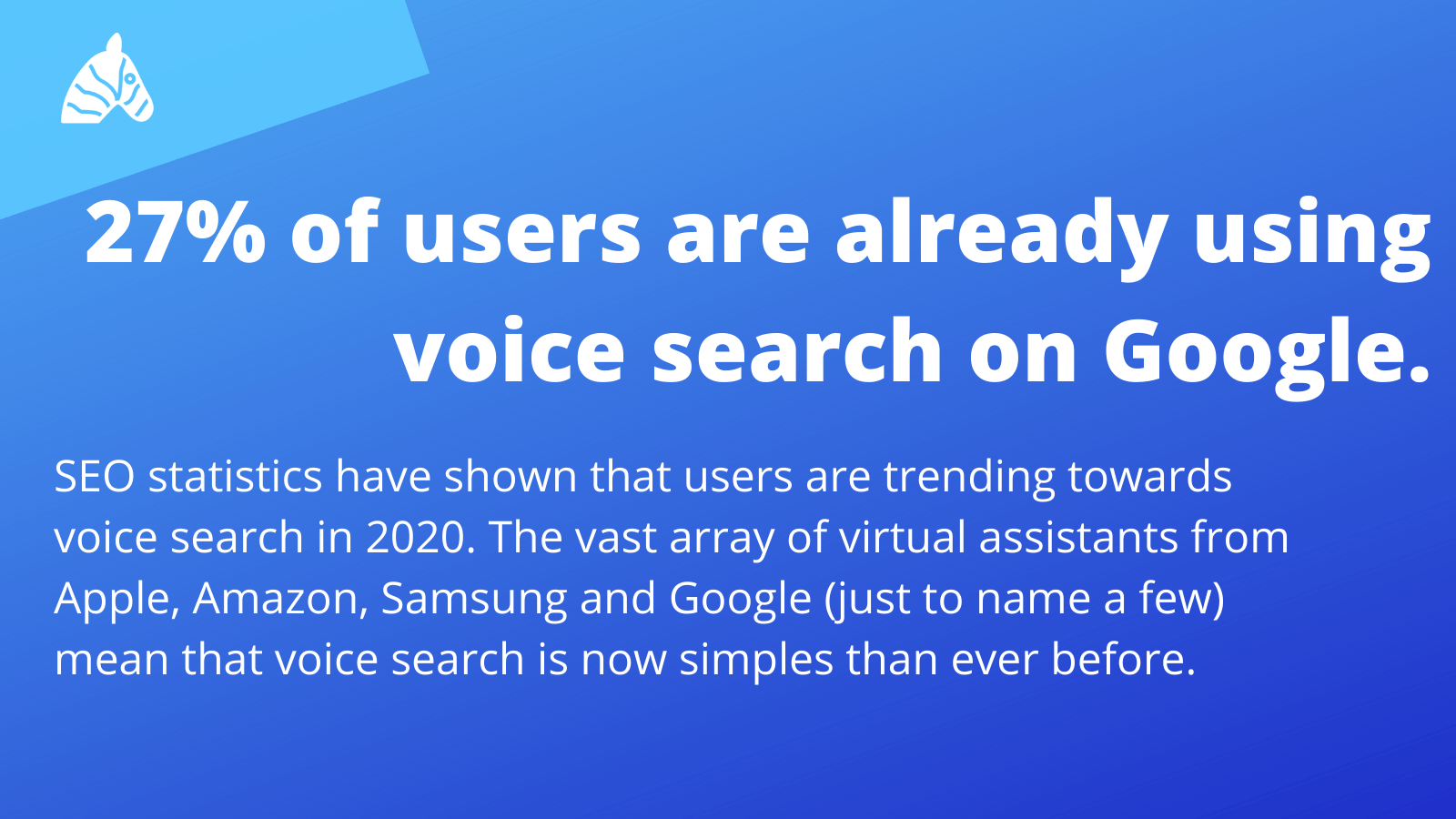
As voice search becomes increasingly popular on various devices, the way people are making searches online is changing. Almost a third of all users are already using voice search on Google – we expect that number to only increase over the next year.
With various devices from Apple, Amazon, Samsung and Google using voice search, the way people are interacting with search is rapidly changing. Search queries are becoming more conversational, relaxed, and use long-tail keywords (much like how someone would ask actually a question rather than a query). This means optimising content for voice search with targeted answers to questions and implementing schema mark-up for voice search. If you haven’t already, it’s time to optimise for voice search. We’re predicting voice to only become more prominent, making it one of this year’s biggest SEO trends.
7. Indexing is Taking Longer
Across the board, indexing is taking longer than ever before. Working across hundreds of different websites, we have witnessed that indexing is now taking considerably longer than it was 12-months ago. Same day turnaround on indexing is now a rarity. We are seeing new pages taking weeks to index in Google and even then, it can be patchy with web pages dropping in and out of index while Google seemingly tests new pages.
We have previously written an article about Google crawl rates for websites ranging from 3-days to 4-weeks depending on a number of different factors. Now, we are seeing considerably slower crawl rates which is resulting in slower indexing and slower updating of rankings based on content changes.
8. Create Content for Users
Unsurprisingly, the quality of content is one of the major SEO trends. The emphasis on creating and publishing high-quality content is not dying down anytime soon. Algorithms continuously ask marketers to create high-quality content that is both user-centric and well optimised. Furthermore, Google continues to make significant updates to its search algorithm that prioritises content that is high quality, user-centric, valuable and satisfies the searcher’s intent.
Creating and publishing quality content is a crucial component of an effective SEO strategy. Users are after content that is relevant, helpful, timely, and will answer their questions directly. Given Google aims to provide the best possible user experience, the search engine will continue to reward the sites that are emphasising producing quality content.
More people are heading to search engines for their questions, and Google is looking to sites that can provide clear answers with well-researched citations. Content reigns supreme – the old saying still rings true. According to the latest research, almost two-thirds of SEO experts rank content creation and content marketing as the #1 way to drive the best results in search marketing, making it contribute arguably one of the biggest SEO trends. As content continues to be the main driving force in SEO, there is only going to be more emphasis on the quality of the content sites are putting out.
9. HTTP to HTTPS – Now or Never
While the security of a website is nothing new, SSL certificates are now essential for your website. As Google moves towards a fully secure web, more users are becoming aware of the dangers of being on an unsecured page – bounce rates are increasing on pages that do not have the SSL certificate installed.
Today, it is absolutely critical to have your website secured with an SSL certificate. HTTPS gives website users a secure connection that is both encrypted and authenticated. According to Google, HTTPS “helps to prevent intruders from tampering with the communications between your websites and your user’s browsers.”
If users don’t feel safe on a website, they will immediately abandon it. SSL certificates have been around since 1995; however, this year, it seems incredibly important to get your site secure if you haven’t already. Given Google has publicly spoken about the importance of encryption, a secure website can go a long way in both user experience and search engine optimisation. The security of your site will unsurprisingly continue to be one of the major SEO trends over the coming year.
10. Google’s Search Quality Guidelines
Back in 2015, Google released its Search Quality Evaluator Guidelines. These guidelines provide webmasters with the three most significant factors Google considers when looking at a web page, and how they differentiate high-quality pages from low-quality pages. These factors include:
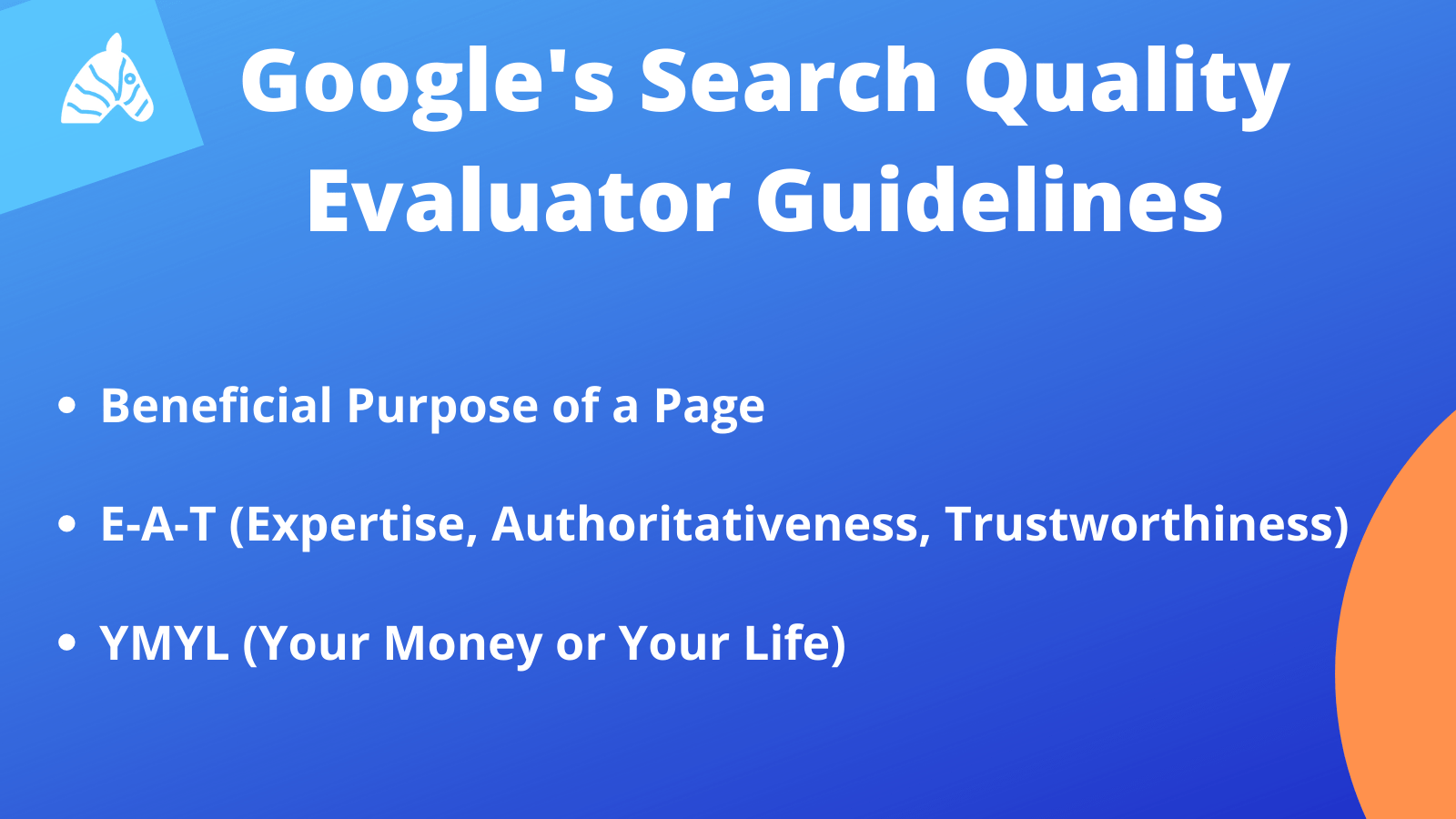
• Beneficial Purpose
Beneficial purpose relates back to the purpose of a page or the reason for the page creation. Every webpage is created for a purpose, whether it be to help users with information, or to merely make money; with little or no effort to help others. In essence, beneficial purpose looks at why the page was created and what it can offer users.
• E-A-T (Expertise, Authoritativeness, Trustworthiness)
Once the beneficial purpose of a page is determined, its level of E-A-T is carefully considered. These guidelines take a look at the expertise of the author, the authoritativeness of the content creator, and the trustworthiness of the website as a whole. A site that scores a high level of E-A-T is one that is of high quality.
• YMYL (Your Money or Your Life)
Your Money or Your Life content is the type of information that, if presented inaccurately, untruthfully, or deceptively, could directly impact the user’s happiness, health, safety or financial stability. In essence, the stakes are pretty high for YMYL content. Creating a YMYL with poor advice or information has the potential to negatively impact someone’s life or livelihood. The categories of YMYL content include:
• News and current events
• Civics, government and law
• Financial advice
• Shopping information
• Health and safety, including medical advice
• Groups of people, particularly for ethnicity, race, religion, nationality, sexuality etc.
• Other
These are the major points of Google’s Search Quality Guidelines. These guidelines serve as a reference for Google’s human search evaluators – the people who check up on and rate how well Google’s algorithm is working. However, the document also provides exceptional insight into how Google’s algorithm should be ranking pages. The guidelines are public, free to access and go into great detail of circumstances in which pages are determined to be of high and low quality.
While these guidelines have been available for several years, the chatter within the SEO community about Google’s EAT and quality guidelines has only gotten louder recently, following an update in September of 2019. With each algorithm change, marketers are turning to the guidelines to support their understanding of what Google deems to be a high-quality web page.
The search quality guidelines may not be a direct search ranking factor; however, the document gives enormous insight into the workings of Google’s algorithm. The search quality guidelines are proving to be a huge SEO ranking factor.
11. Google’s Entity Patent
We’re predicting Google’s investment in entities to only become more important this year. While entities aren’t something that has frequently been spoken about in the SEO community, Google has put a lot of resource and time into their knowledge graph and entities.
According to Google, entities are “a thing or concept that is singular, unique, well-defined, and distinguishable.”. In simple terms, Google uses entities to try to get the search engines to better understand language, and pre-emptively respond to search queries.
An entity can be a person, an idea, an adjective, a concept or anything uniquely defined. Its classical definition does not define an entity; moreover, an entity is based on the prior knowledge that we subconsciously associate with something to help us to understand it better.
Back in 2015, Google submitted its Ranking Search Results Based On Entity Metric patent. While this may not mean anything to you right now, many within the SEO community predict entities to surpass links and content as the primary area of interest for getting websites to rank well with Google. Entities in SEO means that the concept of how a website, piece of content, business, or brand, builds authority will change dramatically.
Already, entities are becoming a huge factor for search, and the way search results will display to users. The technology is only going to become more sophisticated, making it one of the most significant SEO trends that we will see this year.
12. Structured Data
Structured data is a system of pairing a name with a value that supports search engines to categorise and index content online. With all of Google’s sophistication and evolving technology, the search engine can still have trouble understanding context. In SEO terms, structured data refers to implementing some additional details to provide that context. One of the most significant SEO trends that we are observing is for marketers to continue utilising structured data to provide the search engine with “hints” to better understand and deliver results.
When executed well, structured data helps search engines to clearly understand what is on a page, how each element on a page is related, and how the content relates back to other areas of a website. Skilled marketers will continue to leverage their structured data to enhance their analytics so that they can gauge what part of their content is driving results, and adapt from there.
13. Sustainable Link Building
Link building is still the number one contributing factor to getting your website to rank well on Google. As Google’s algorithm evolves, the nature of link building and link acquisition is naturally changing. The growing demands of Google’s webmaster guidelines for ethical SEO mean that link building centres on creating genuinely meaningful connections with other sites. As far as SEO trends go, ethical and sustainable link building is only becoming more critical.
Link building requires an ethical approach that positively impacts a website and brand image. In an age in which every link undergoes scrutiny, link building efforts should align with brand-building efforts. If you want to increase the visibility and authority of your brand, you should be focusing on acquiring links that are of high-quality and are relevant to your website.
Link building is no longer about chasing high quantities of links, spammy links, broken links that might fit anchor text, or low-quality guest post links. Ethical link building involves fostering connections with websites that are well-aligned with your brand to build the trust, authority, and relevance of your content. Furthermore, ethical link building means relying on high-quality backlinks that are going to continue laying the foundation for your website during and after any Google algorithm updates.
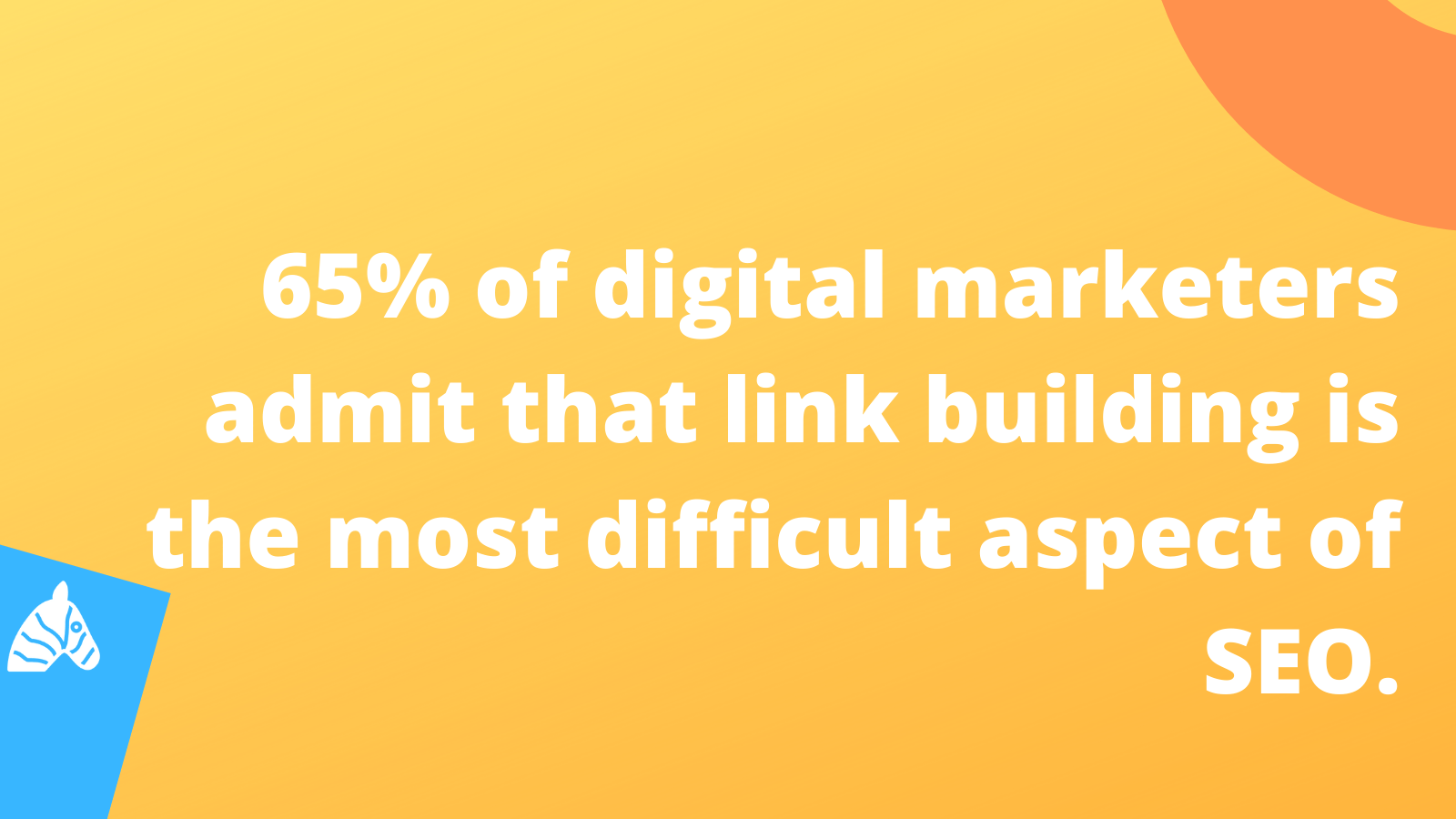
14. Video Content for SEO
Video content will continue to contribute to the way websites rank in Google. Over the last 12-months, people spent an average of 67 minutes of consuming video content each day. With each year, we can expect that number only to grow. It is a long established fact that video content is a good way to drive conversion with visitors, however, did you know that video content is five times more likely to drive a conversion than written content?
Video content is only becoming a more valuable SEO trend this year. Videos attract and retain visitors, and pages with videos are 53% more likely to be displayed on page one of Google. The most significant adjustment that we are noticing this year is the shift in quality. Users are looking for videos that help them to learn more about a product, service, or subject.
While video content is clearly important, it’s essential to ensure the video does not inhibit the user experience and that webpages can still load quickly. Spammy videos that are irrelevant, unhelpful, and not optimised will not do your websites any favours.
15. Google Page Experience Update
Finally, one of the other significant SEO trends we’re predicting is the growing awareness of page experience. In May of this year, Google announced that they would be making page experience an official ranking signal. While the implementation is still more than six months away, the announcement has left quite the impression on the SEO community.
Page experience refers to a set of signals that measure how users perceive the experience of interacting with a web page beyond its pure information value. The ranking signal will base on Google’s Core Web Values (a set of values that measure loading performance, interactivity, and visual stability of a page), in combination with several existing search signals like mobile-friendliness, safe-browsing, HTTPS, and intrusive interstitial guidelines.
The announcement shouldn’t come too much as a shock; Google is always looking at ways to better enhance the experience of the user online. It isn’t a ranking signal yet; however, page experience is set to be one of the largest SEO updates of the past twelve months.
Conclusion
The beauty of search engine optimisation is that it is always changing, adapting, and evolving to meet the needs of the search engine giant that is Google. With so many elements at play, the industry provides an endless need to continually learn and strategise if you want to come out on top.
In such a fast-paced environment, learning about SEO trends and adapting is crucial to achieving success online. As a marketer, the key with new SEO trends is to continue to test, analyse, learn, and implement. At Safari Digital, it is our job (literally) to carefully observe, anticipate, and adapt to these SEO changes. If you’d like to learn more about what SEO can do for your business, get in touch with one of our consultants at Safari Digital today.



